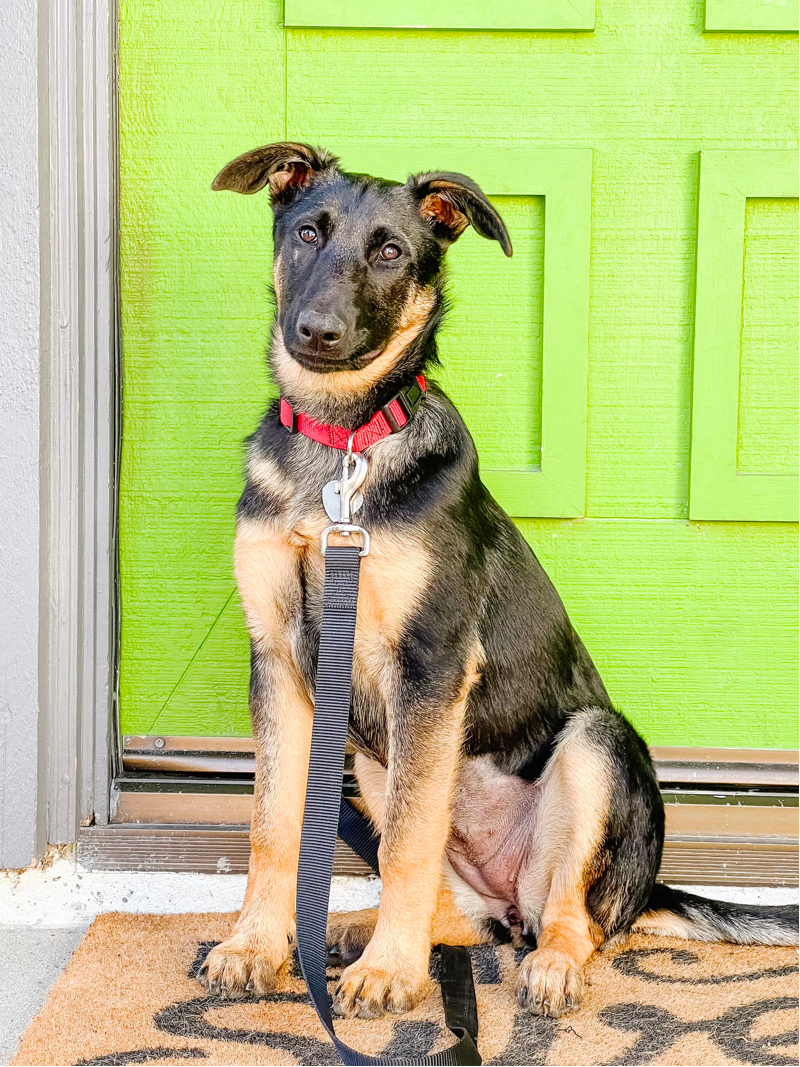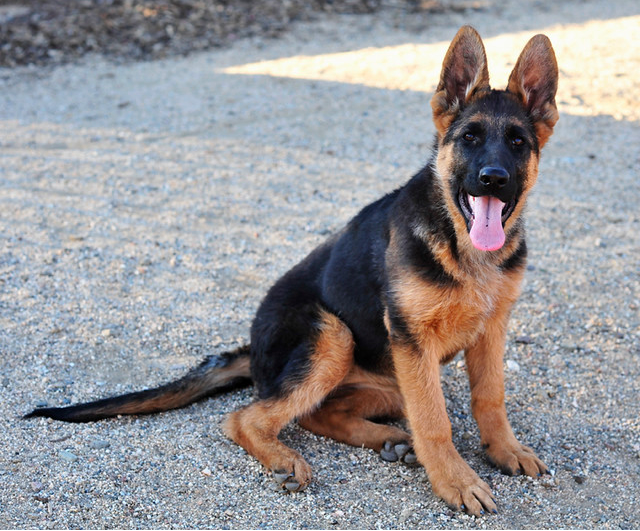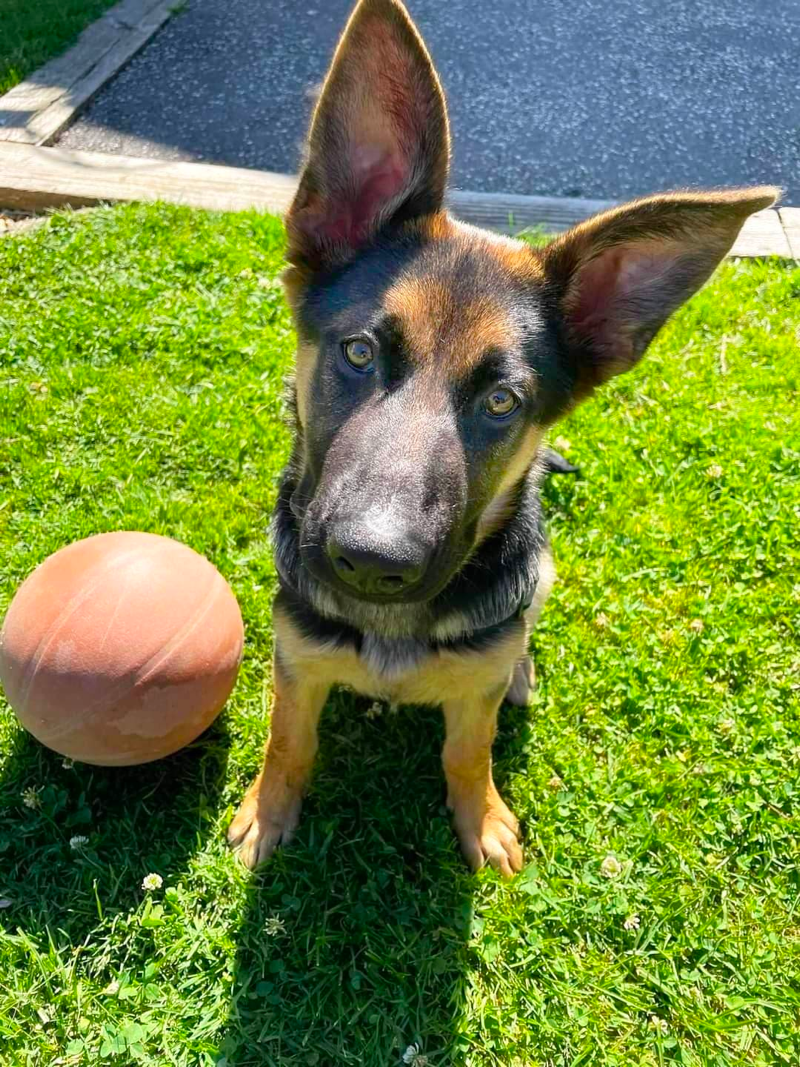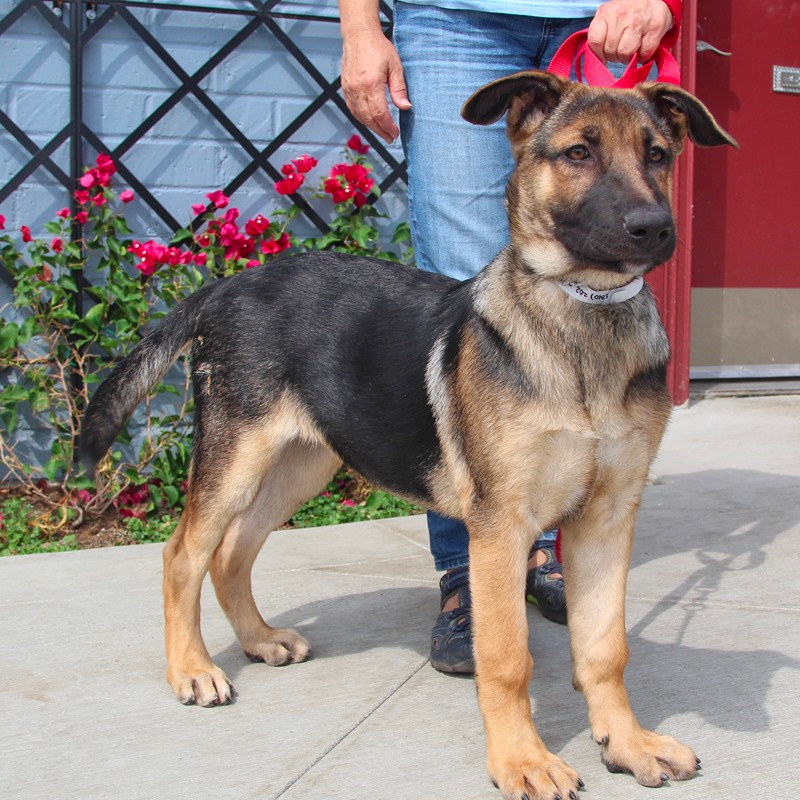Contents
- What To Expect From the 4-Month-Old German Shepherd Puppy
- 4 Month Old German Shepherd Puppy Schedule
- How Big is a 4-Month-Old German Shepherd Puppy?
- How Much Should You Feed a 4-Month-Old German Shepherd?
- How Much Sleep Does A 4-Month-Old German Shepherd Puppy Need?
- How Much Exercise 4 Month German Shepherd Puppy Need?
- 4-Month-Old German Shepherd Puppy Training
- How Healthy is A 4-Month-Old German Shepherd Puppy?
- Conclusion
A few more weeks should have gone by and your German Shepherd puppy should be a much more mature 16-week or 4-month-old puppy. At this stage, you should definitely give yourself a pat on the back as the German Shepherd puppy should have shown quite visible growth in appearance.
If you’re worried that your adorable German Shepherd puppy would lose its overall cuteness or adorability at this stage, then you shouldn’t be as the German Shepherd at 4 months still has all the cuteness and playful nature as the 8-week-old German Shepherd. However, they should look a little more mature and bigger.
In this article, we provide you with all the needed information on the 4-month-old or 16-week-old German Shepherd puppy. This should include information about its behavioral and physical changes, as well as the requirements or necessities for living with a 4 month German Shepherd puppy.
The 4 month or 16 week mark is a pretty interesting age for the German Shepherd puppy. At this stage, it is expected that the German Shepherd puppy should be nearly half of its full adult or mature size.
Related posts:
- 8-Week-Old German Shepherd: Loyal, Energetic, Active Canine Partner
- 3-Month-Old German Shepherd: A Busy, Active, Playful Ball of Energy
- 6-Month-Old German Shepherd: Energetic, Curious, and Playful Puppy
What To Expect From the 4-Month-Old German Shepherd Puppy

For the 4 month German Shepherd puppy, there should be a lot of marble changes and differences to expect and look out for. Well, at the 4-month age mark, the German Shepherd puppy should be expected to have fully developed their traits and various personalities, as they should be a lot more mature.
This is why training should also be easier as you should be able to fully distinguish their various traits and personalities to map out a proper training program for them. Another thing that might be apparent at this stage is the puppy’s sudden rebelliousness. Again, proper training and socializing is needed at this stage.
Exercises are also highly recommended for the German Shepherd at the 16-week mark. This should include physical exercises to keep them fast, agile, and strong while also increasing endurance. Mental exercises should also be included at this stage to keep your puppy sharper than always.
Exercises are also needed to keep the 4-month-old German Shepherd puppy from being very destructive, especially in smaller environments or households and apartments. At this age, your German Shepherd puppy should feel a lot more protective of its owners than usual, and this can lead to some flashes of violent energy and vigilance.
In terms of curiosity and learning, by 4 months of age, your German Shepherd puppy should be pretty keen on soaking up new experiences and knowledge, as such you would most times find them searching for various opportunities to run off exploring the environment. This should make the processes of socialization further easy for each German Shepherd puppy owner.
While in their protective phase, It is natural for the 4 month German Shepherd puppy to attempt to bite you. As stated earlier, this is a natural and normal process that happens during the teething stage for the German Shepherd puppy.
4 Month Old German Shepherd Puppy Schedule

At month 4, it is expected that your German shepherd should be receiving their third set of vaccinations and dewormings. This should help keep them healthy and strong. In this set of vaccinations, they should receive rabies shots and DHPP. If they haven’t received their shots, then consider taking them to a vet immediately as the vaccinations shots are quite crucial.
German Shepherds are known to be heavy shedders, and at this stage, they should be shedding pretty heavily, this is because they should be going through a change from puppy hair and fur to more adult hair and fur. This is why you would need to regularly groom them, comb out all loose hair and keep them looking good.
A steel comb is perfect for combing through the German Shepherd puppy fur. Always make sure they take proper baths with proper shampoos at this stage in their lives. It is worth noting that you don’t need to bathe them often, just ensure when you do, it is done with the proper tools and with the proper process.
Training is highly essential at this stage or age of the German Shepherd’s life. This is why you would need to be a lot more focused and persistent with your training program. Generally, the German Shepherd should be a lot more attentive to training sessions at this point so it should be a little easier if you make use of a proper training method.
It has always been advised to use the positive reinforcement method of training for German Shepherds. Patience is also a highly required skill when training your German Shepherd puppy at this stage.
And for socialization, as stated earlier, your puppy should be a lot more curious than before so provide them with a safe and controlled environment for them to explore. New environments, textures, sounds, and faces can help your German Shepherd puppy become a lot more confident.
How Big is a 4-Month-Old German Shepherd Puppy?

A 4-month-Old German Shepherd puppy should look a lot less like a puppy but a lot more like a young adult. This does not mean they any longer retain that puppy-like cuteness, that they had at 2 months and earlier.
The weight of the German Shepherd puppy should be a lot higher as it is expected to be at least half the weight of a mature German Shepherd puppy (so anywhere between 30 to 40 pounds) for males.
Female German shepherds should be slightly smaller at 28 to 35 pounds in weight. The height of the male German Shepherd should be between 12 to 15 inches. And for the female, it can range from 11 to 14 inches in height.
Also, the breeding purpose does have an influence on the overall height or size of the German Shepherd puppy as puppies from working lines are often slightly smaller than the Show line German shepherd puppy.
How Much Should You Feed a 4-Month-Old German Shepherd?
Your German Shepherd puppy should be a large dog at this point, sitting at a possible 30 to 40 pounds of weight and over 12 inches of possible height. With that being said, their appetite should also be high. This is why the feeding schedule can be slightly changed to include an extra feeding session a day, to make it three sessions in all.
If your German Shepherd puppy is a lot active during the day, then the calorie count should be between 2000 and 2100 a day. And if it is less active, the calorie count should be between 1100 to 1272 each day.
The feeding kibble should be quite healthy and contain the appropriate nutrients. It should contain enough protein (between 20% to 25%), it should contain enough fiber (between 3% and 7 %) and it should contain enough fat (between 10% to 15%).
The number of cups of kibble per day to be served to the German Shepherd puppy at 4 months old is between 1 cup to 1 ½ cups per meal. This should be a good start, as the puppy gets a little older you can make the transition to 2 cups per meal. Ensure you do not feed your German Shepherd puppy junk food.
How Much Sleep Does A 4-Month-Old German Shepherd Puppy Need?
At 4 months of age, the German Shepherd puppy does require a lot of sleep to stay functional. They should be going through a lot of changes both physically and mentally at this stage, which can lead to exhaustion pretty fast.
As such, it is expected that you provide each German Shepherd puppy at 4 months of age between 17 hours to 20 full hours of sleep each day. This can be carefully integrated into the puppy schedule by allowing them to take small or short naps in between play time or walkouts.
Sleep at night is quite crucial for the 4-month German Shepherds, this is why they do need to take longer night sleep than usual. They should be allowed to sleep early and you can influence this by allowing them to take their dinner early. No late-night feeding.
How Much Exercise 4 Month German Shepherd Puppy Need?

As we have already specified, exercising your German Shepherd is a sure way to tire them out and help get rid of that excess pent-up energy that might be quite destructive if not released properly. So, exercises are pretty important for German Shepherd puppies.
Exercises for the 4-month-old German Shepherd puppy can come in less organized forms or short bursts of play, this can be done for several hours in the day to keep the German Shepherd quite entertained and happy.
You can also set aside 30 minutes to 45 minutes each day to fully exercise the 4 month German Shepherd. You can do this with light walks each day. This can be broken down into two separate sessions.
As the German Shepherd puppy gets older, this exercise duration and intensity can change a little to make them a lot more fit and healthy. In addition to physical exercises, the German Shepherd is an intelligent canine that can handle good mental exercises.
A puppy puzzle can be used on a German Shepherd of 4 months old. Just make it clear that there is a reward for solving the puzzle to keep the German Shepherd puppy interested throughout the process.
4-Month-Old German Shepherd Puppy Training

Your 16-week-old German Shepherd puppy should present you with some bit of trouble at this stage in their development. Accidents involving potty are prone to happen at this stage in the German Shepherd’s life.
With that being said, it is essential that you are patient when dealing with your German Shepherd puppy. German Shepherds are known to bite, especially during the teething stage, they can also proceed to chew furniture and other household equipment if left unchecked and untrained.
To stop all these and many more, you would need to employ a much more effective training method to help keep them in check. The positive reinforcement method is quite good. It involves patience and the use of reward systems to keep the puppy in check.
Be careful not to overdo it when rewarding your German Shepherd puppy at this stage in their life as they can get pretty spoiled pretty fast. German Shepherds are very intelligent dog breeds, so training using this method should do a lot of wonders.
How Healthy is A 4-Month-Old German Shepherd Puppy?
At 4 months of age, your German Shepherd puppy should be closely monitored for any changes as this is about the time frame for any possible defects to start showing signs. If you are updated on your medical records and vaccination records, then congratulations on a job well done.
If you aren’t, then consider immediately taking your beloved German Shepherd puppy to the vet for a complete and thorough evaluation. You can do DNA testing on your German Shepherds to be able to monitor whatever possible defects might be with your puppy.
If you obtained your puppy from a proper and reputable breeder, this should not be a problem, however, it is still recommended that you carry out the necessary health testing.
A Few Health Issues To Look Out For:
- A decrease in appetite
- Changes in sleep patterns
- Diarrhea
- Changes in personality
- Skin dryness or itchiness
- Difficulty in urinating
- Weight loss
- Excess sneezing or coughing
- Excess Urination
- Vomiting
- Runny nose or eyes
- Difficulty in breathing
Conclusion
If you have made it to this stage in the German Shepherd puppy’s life as its owner, congratulations, you have done a great job! However, that should not be enough as there still is a lot more to be done.
Carefully watch your German Shepherd puppy to be sure they are getting the right care and attention they require. Give them the best food and supplements, regular visits to the vet are a must and ensure they get enough exercise and rest as well.

 Top 10 Best German Shepherd Breeders in Arizona (AZ)
Top 10 Best German Shepherd Breeders in Arizona (AZ)